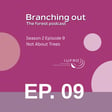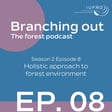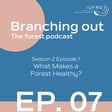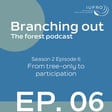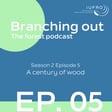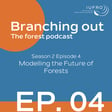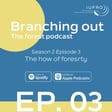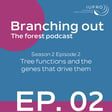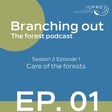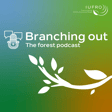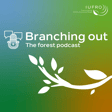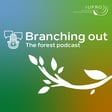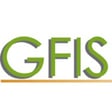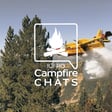Engaging Youth in Forestry
00:00:00
Speaker
The best strategy to encourage young people is to listen, collaborate and invest. Listen to our perspectives and needs to prepare ourselves for a career in forestry. Collaborate with us in on ground and project level initiatives. And most importantly, invest in us so that we can successfully pave the way for the youth towards holistic engagement in the forestry sector.
Introduction to 'Branching Out' Podcast
00:00:33
Speaker
Welcome to Branching Out, the Forest Podcast, where we connect forests, science, and people. Brought to you by the International Union Forest Research Organization, IUFRU. Let's discover the role of forests and trees for people and nature while we unravel complex forest topics and keep you up to date with forest research.
00:00:52
Speaker
My name is Jose Bolaños. I'm from the IUFRO headquarters. Today it's a bittersweet moment because this is the season finale and we have got great
IUFRU World Congress 2024 Recap and Registration Call
00:01:00
Speaker
company. To recap, we started the season with general information about the IUFRO World Congress 2024 in Stokholm. By the way, have you already registered?
00:01:09
Speaker
If not, go to ayufro2024.com. Then we talked to some excellent guests about recisions and adaptation. Forest by economy, biodiversity, and on our previous episode, we covered a lot of topics regarding the connections between forests and society with 10 extra minutes of content. If you haven't heard it, please go check it out.
00:01:29
Speaker
So, to commemorate this excellent moment, we've decided to host a very special party of sorts.
Special Guests Discuss Forestry
00:01:35
Speaker
So, here with us is Daniela Kleinschmitt, who will become Ayufro's President after the Congress, Gudenshoem, who will be overseeing the Ayufro Divisions as Vice-Resident. And last, but certainly not least, we have Isabel Claire, who is the President of ISSA. Welcome to all of you.
00:01:55
Speaker
Hello, Jose. Good to see you. My name is Allela Kleinschwiedt, and I'm Professor for Forest and Environmental Policy at the University of Freiburg in the very southwest of Germany. And, well, I'm actually, at the moment, Vice President for Divisions of IFRO and the upcoming IFRO President.
00:02:13
Speaker
Good to see you, Jose and everybody. My name is Wudam Chong. I'm a professor of forest engineering at Oregon State University in the United States. I'm also deeply involved in UFRO currently serving as UFRO Division 3, which is forest operations engineering and management and UFRO Division 3 coordinator. And I'm also the incoming UFRO vice president for divisions.
00:02:34
Speaker
Hi, Rosé, Daniela, Woodham, and our listeners. I'm Isabel from the Philippines, and I'm the president of IPSA, which is the largest association of students from forestry and related sciences worldwide.
00:02:47
Speaker
So maybe we can start with a small expectation question. What do you expect him from the EU for Congress or what memories does it
Building Excitement and Collaboration for IUFRU Congress
00:02:55
Speaker
bring? I just want to say that I'm incredibly excited about the Stockholm UFO World Congress in June. We've all gotten used to online meetings, but they cannot just replace the energy of being in the same room with people who share their passion. Just picture what it will be like having 4,000 Wall Street experts exchanging ideas.
00:03:17
Speaker
all the amazing conversations and collaborations and of course celebrating with colleagues and friends over a glass of beer as well. So the youth will play such a pivotal role in the Congress because of how much space we are given for our advocacy.
00:03:32
Speaker
If some members, including myself, are very excited to learn, interact, and be inspired by forest experts, researchers, and practitioners from around the world. And since this is my first IU for World Congress, I am personally excited to meet young forestry professionals like myself at the Congress and see Stockholm for the first time. I'm looking forward to discuss more about this in today's conversation.
00:03:57
Speaker
I'm very much looking forward as well to the IO4 Congress. It's only a few days to be there and to meet everybody. And for me, the IO4 Congresses and Isabel, it's some more for me. So it's not the first time I've been on the IO4 Congress and I can assure you.
Networking and Idea Exchange at IUFRU Congress
00:04:13
Speaker
It's a great pleasure and it's something you will never forget about because you're meeting so many friends, old friends and new friends. And they are from different disciplines and they are from different parts of the world. And so having this exchange, having the opportunities to learn about the newest, newest of science from the different disciplines, but as well to meet those friends and
00:04:36
Speaker
Even if I'm not drinking beer, Woody, I'm very much looking forward to seeing you and to see Isabelle and Jose and anyone else. So it's a great pleasure to have everybody there. And so for me, it's the sessions as such that you learn about new things, but as well the coffee breaks, which is the most important issues there. Again, welcome. And I'm going to start with Daniela.
Challenges of Climate Change in Forestry
00:04:56
Speaker
What are some of the challenges that you foresee in the forest for the coming years?
00:05:00
Speaker
I think one of the challenges we all know that we have been aware of for decades now is the one of climate change. And it's not climate change as such was a change in the world, but for science is as well difficult because
00:05:15
Speaker
we have to do decisions or we have to do our sciences under uncertainty. So we don't know exactly what is coming up in the next year. So that might be one of the biggest challenges the forest sector and as well the forest research has to do because we don't know how situations will be in five years from now in the different regions of the world. And it has very different effects on different regions in the world. And I think to
00:05:40
Speaker
cover that and to understand that we have uncertainties as well. In science, that is a big challenge for an organization which is useful. We want to have responsible decisions. We want to have robust science and all of that, but still we don't know exactly how it will turn out. And we have to live with that and we have to cover that as well. So that is one from the science perspective and more from the organizational perspective. I would think that still, and we have discussed that for many years as well, that
00:06:06
Speaker
We want to give a global perspective on forest sciences, which is not always easy because we need to cover different regions as well with different priorities, with different goals. And what is in one region very important might be not for the other regions. And to cover that in an organization like IUFRO, that is another challenge we have to deal with in the next years as well.
00:06:29
Speaker
How do research, communication and outreach play a role in supporting borders in the world and safeguarding natural resources for future generations? That was a very long question, Jose. It was transfer, outreach, communication and the young generation. Is that true?
00:06:49
Speaker
Is there anything else, was it? OK, I thought we could make it a little bit larger. I think it's very important, of course, because while we can do lots of wonderful and interesting research and for researchers, that is maybe the first goal to do that. But on the other hand, if we just keep it for ourselves and our own community, then it's getting difficult. So if Woody has wonderful results from his research and he does publish it in wonderful journals, it will be just his peers.
00:07:16
Speaker
Yeah, of course, he's excited about that. And you should be. That is one of our things we love to do, which we've learned to do. But on the other hand, it will only reach his community. And that's the same for me. So if I'm publishing something that is interesting and I feel very rewarded and I've published this great stuff and so on, and then it's read by my colleagues who know me already and who know parts of the story. But we need to bring it as well to the political decision makers. And so that is as well part of an organization like Iofro to do that stuff, to be in community.
00:07:46
Speaker
communication being in transfer. And of course the use, Isabella is already in the online room, in the digital room. I think it's most important and it's for IOFRO as well, very important that we keep younger generations well integrated in IOFRO right from the beginning because it's you who should set the agenda and it's maybe not us, the older person who say what might be relevant in 10 years from now.
00:08:11
Speaker
Wouldn't you are laughing? You of course not. So might be.
Role of AI and Smart Machines in Forestry
00:08:15
Speaker
You're working in the field of forest innovation, right? Can you give us some examples of innovative approaches that have been successful in supporting forest research and management? Well, I'm not able to publish wonderful papers.
00:08:28
Speaker
But some of the work that I'm doing is related to artificial intelligence AI. As you all know, artificial intelligence AI is everywhere these days and forestry is no exception. We have seen it revolutionize the way we analyze data.
00:08:45
Speaker
But what about the actual work out in the woods? Well, get ready because smart machines are on their way. So picture this, harvester machines with AI eyes that don't just see a forest but individual trees. They can scan each tree.
00:09:01
Speaker
measuring size, shape, location, even defects. And in real time, the AI decides which trees need to go for the good of the forest. But it's not just about the machine. Imagine the machine talks to the operator through augmented reality, highlighting the right trees to cut, guiding the process.
00:09:22
Speaker
or even wilder of a machine that does the cutting all on its own without an operator. That's the future of forestry. But the more important thing is that this isn't just about efficiency. It is about taking care of our forestry workers and forests better than ever.
00:09:39
Speaker
Think about those critical forest thinning projects, the ones that help reduce wildfire risk or improve forest health, such as forest restoration work. Instead of just eyeballing the work, AI can be the expert guide, pinpointing exactly which trees need to go away for the overall health of the forest. Plus, knowing the quality and type of wood before the tree is even cut, that changes everything in terms of waste and efficiency.
00:10:08
Speaker
The right logs can go to the right places for the right uses. It's a win for the forest and a win for the industry. Well, this stuff might sound like a science fiction. I actually thought about Terminator 1, 2, 3. And Mission Impossible.
00:10:24
Speaker
So this stuff might sound like science fiction, as you pointed out, but trust me, it's happening really. Researchers are working hard to bring these kinds of technology out of the lab and get them into the hands of forest workers. I first read and later heard from Elena, which was in our first episode.
00:10:42
Speaker
Something about forestry 4.0.
Forestry 4.0 and Industry 5.0
00:10:45
Speaker
What is this? Well, basically builds on the same industry 4.0 concept we saw in manufacturing, such as smart technology, AI automation, all those good digital and information technologies.
00:10:58
Speaker
The AI-powered harvester I mentioned earlier, that is a good example of Forestry 4.0 in action. But here is the thing. Industry is already talking about the next step. Industry 5.0. And it's all about focusing on people and the planet. Not just profits and growth. Does this sound familiar? This is how Forestry has operated for a long time already. Sustainability, community.
00:11:23
Speaker
It's in our DNA. So when it comes to tech and innovation, well, forestry, we've sometimes been playing catch up, right? Catch up other industries because we are lagging behind from steam power to the latest digital technology.
00:11:39
Speaker
But this time, with Industry 5.0, 435.0, I think it's our chance to lead. We can be the blueprint showing the world how an industry can be sustainable, human-centered, and cutting-edge together. So I would say our time is coming.
00:11:57
Speaker
Well, I like the optimism, right? It's actually great to hear that in 5.0, humans should play a central role. I think that was missing a lot in the versions before. And it's of course very nice to hear that industry can count from one to five. That's great.
00:12:14
Speaker
Actually, one of the research that my lab has been doing is also how to help forest workers physically using exoskeletons. So it's like when we talked about science fiction, robocops, right? Or terminator. So forest workers, you know, working out in the woods, it's a
Social Innovation and Governance in Forestry
00:12:32
Speaker
physically very high demanding job and very difficult and dangerous.
00:12:36
Speaker
So we're looking at exoskeletal and wearable devices that can support their muscles, their backbone, and so on. So we're looking at how effective they would be when the timber fallers wear them while cutting the trees with chainsaw and also tree planters.
00:12:53
Speaker
You were talking with Woody about the innovation part and I was wondering whether social innovation is relevant in there too. And of course, whether you are going to prevent this science fiction stories as well in Stockholm. Oh, I'm pretty sure that you have included it, isn't it? So that while it's as well a matter on how people are working together or what is the best way on working together to get new ideas about new governance
00:13:19
Speaker
versions or new management informations or something like that so all that could be included in social innovations which is really important as well for technical issues in the end as long as it helps people as long as it helps you know how we can manage forest better that's all we want that's very important but but you know
00:13:38
Speaker
Myself and my team, we are engineers basically, so we are developing devices and techniques, but we are not really good at social aspect of those innovations. The skeletons that I mentioned is about safety and health of force workers, but how that benefits the community, the people, that's all about what you've been doing, Daniela, and your colleagues.
00:14:01
Speaker
And that's why we have this World Congress, so the two of you can meet and then see how the social innovation could be included in projects such as the XOX skeleton and the other ones that include artificial intelligence. Whether it's strategies or initiatives that could be implemented to encourage young people to pursue careers in forestry and in forest research, forest science.
Enhancing Forestry Education and Youth Engagement
00:14:23
Speaker
Since the last decade, there's been a decrease in the number of young people interested or engaged in the forestry sector because of factors like a lack of awareness about career opportunities in forestry and inaccessible resources to develop our skills to pursue a career in the sector.
00:14:43
Speaker
And this was also my personal struggle when I was just starting out as an undergraduate in my forestry program. But thankfully, because of the capacity development initiatives of organizations like IPSA and Ayufro, I became more aware of what my future could look like and how I can contribute to the future of forests.
00:15:04
Speaker
And this is the exact essence of IPSA. Beyond connecting forestry students around the world, our volunteers create enriching programs that develop the academic and professional skills and experiences of our members.
00:15:19
Speaker
IPSA and IU FRO have been strong partners for a long time now, given that both organizations have similar goals when it comes to strengthening forestry education. And one of the most significant collaborations is the IPSA and IU FRO Joint Task Force on Forestry Education, which brings together students, educators, and other stakeholders to fill in the gap that
00:15:43
Speaker
traditional forestry education cannot meet and as well as highlight the different ways to make forestry attractive for the young people. And we do this by developing research that identifies issues and solutions for effective forestry education and communicate these findings to stakeholders.
00:16:05
Speaker
In 2021, IFSA and IUFRO published the Building a Successful Forestry Career in Africa book, which we distributed to forestry universities in Africa to raise awareness among the African youth on the different opportunities that they can take to pursue a successful career in forest. So the joint task force also create
00:16:27
Speaker
educational activities like webinars and competitions to capacity forestry students and educators with knowledge and skills that we don't typically gain in the far walls of our classroom. We recently initiated the global competition on best practices in forest education, where we recognize the work of educators who innovated on ways to promote forestry education during the COVID-19 pandemic until now.
00:16:55
Speaker
And actually, the winners will be awarded during the upcoming IU FRO World Congress in Stockholm, Sweden in June. And also, we will be celebrating the achievements in combination of the joint task force. So this is something that we should definitely look forward. And just by looking at the impressive efforts that we have been creating with IU FRO, the best strategy to encourage young people is to listen, collaborate, and invest.
00:17:24
Speaker
listen to our perspectives and needs to prepare ourselves for a career in forestry, collaborate with us in on-ground and project-level initiatives, and most importantly, invest in us so that we can successfully pave the way for the youth toward holistic engagement in the forestry sector.
Youth Participation and Project Showcases at IUFRU Congress
00:17:44
Speaker
How can the Youth for Network promote more perspectives from the youth going forward? There are a lot of things that we can do to promote more perspectives from the youth going forward, but we can simply start by giving us young people the space to advocate for our perspectives and calls for action.
00:18:00
Speaker
Nowadays, more and more spaces are given to young people both online and offline to influence other people to tackle forestry and environmental issues individually and collectively. At the 2024 IU for World Congress, IPSO will be leading a subplanary session named Power of Youth in Scaling Multisectoral Collaboration
00:18:21
Speaker
the role of forests in achieving the vision for 2050, which will allow young people to highlight the role of youth in tackling global challenges in the forestry sector. And on top of that, we are also organizing the incubator session, where students and young people can present their thesis or project to the international audience that we have at the Congress.
00:18:44
Speaker
But of course, we shouldn't stop there. Even more importantly, we must enable the youth to create spaces for ourselves by using our expertise and resources for capacity development. IPSA and IU FRO are conducting the mentorship program for young participants at the 2024 IU for World Congress. And through this program, we will be connecting students and scientists to learn from each other and at the same time develop the youth skills and interests
00:19:12
Speaker
in a scientific career so going back to the question by investing in the youth we are creating an enabling environment for them to have a seat at the table and openly amplify their focus we are building a solid foundation for a future where our forests and environment will be in the safe capable hands of young generation.
00:19:34
Speaker
But of course, all these milestones in youth engagement would not be possible without the joint task force, including Sandra as the coordinator. So thank you very much for your dedication and leadership, as well as Wudum for your commitment to future youth engagement in the organization.
00:19:50
Speaker
And of course, thank you and big congratulations to Daniela for being the first female and next president of Aifro and for your unwavering support to the youth. And I'm very honored to be here today with leaders that have paved the way for a forestry sector that values and honors the next generations of forests.
00:20:08
Speaker
maybe highlights what she has just said is that the interest is really enormous when it comes to well working together and collaborating together and I think it's on equal footing actually because we have this mentorship program as Isabel has mentioned it and
00:20:25
Speaker
There is really many more people than we have expected that have registered for becoming either a mentee or becoming a mentor at this IFO World Congress, which we think is already a great success that people want to talk to each other and want to work and collaborate.
00:20:41
Speaker
and one of the things we want to do apart from some networking meetings and so on and we want to give a prize as well so there is a quiz or well it's more than a quiz is to ask them for
00:20:57
Speaker
developing a plan for a continued mentorship program, how this could work for the future. And the best proposal will win that they can really implement it. So it will be supported financially as well to get this done and to get a well-continued mentorship program.
Mentorship and Collaboration at IUFRU Congress
00:21:15
Speaker
And there is another question, and that is a question, what can IOFRA do on a continuous basis as well to
00:21:22
Speaker
further well develop this collaboration between the future generation of scientists and the well for the moment generation of scientists to also work together and that is again a question which will be honored by a prize at the IO4 World Congress.
00:21:39
Speaker
Thank you a lot, Jose, for inviting us. It was a pleasure. And see you all in Stockholm very soon. This is very good to close one season of the podcast already. So thank you very much to the three of you for this information. For me, I take that there is a lot still to do in terms of forest research, in terms of forest science from the beginning. I will be a little bit scared about what Buram is developing, but I'm sure that after the Congress, you know,
00:22:09
Speaker
Having some conversation adding the social component to it that would be more at ease after that and then of course all the opportunities that we will see realized for youth in the congress and for forest education as well. Thank you very much to all of you.
00:22:24
Speaker
I really hope to see you all in June at the World Congress. Thanks again to our guests and to you, our listener. Listen to branching out wherever you listen to podcasts. We will be announcing a new season soon, so make sure you subscribe and follow us on social media. And check out more content from Ayufro at ayufro.org or click on the link in the show notes. Bye-bye. Thank you every one. See you in June. See you in June.

